The Salesforce Architect exams each come with a resource guide, which includes helpful links for each section of the exam. I have found those incredibly useful in my study. Resource guides don’t currently exist for the standard exams, so I have compiled content into a series of resource guides. This is the Marketing Cloud Consultant resource guide.
The Marketing Cloud Consultant certification focuses on a deep knowledge of the advanced configuration options within Marketing Cloud. There are 3 Marketing Cloud certifications, and they require hands-on experience with the tools. This was easily the hardest of the 6 consultant exams I have passed. I recommend lots of study of data management concepts, data model possibilities, and advanced subscriber configuration. Before taking this exam, I had lots of time in marketing, as well as experience consulting on the platform. But this exam stretches further than just standard configuration into complex scenarios. I enjoyed learning, but it definitely took a couple of failed attempts and a lot of study and practice.
Understanding the Tests
As I mentioned in a previous post, understanding the intention and structure of the exams is key to passing. Salesforce provides a study guide for every certification test. In those guides, they provide a breakdown of the different sections and their relative weight. Take note of those while studying.
Breakdown
| Topic | Weighting | # of Questions |
| Contact Builder | 14% | 8 |
| Discovery | 13% | 8 |
| Data Design | 13% | 8 |
| Conceptual Design | 12% | 7 |
| Journey Builder | 11% | 6 |
| Account Configuration | 10% | 6 |
| Automation | 8% | 5 |
| Reporting | 7% | 4 |
| Marketing Cloud Connect | 6% | 4 |
| Email Build | 6% | 4 |
Under each topic in the study guide, there are bullet points that describe the information you need to know. For example, the ‘Journey Builder’ section, the bullet points are:
- Compare and contrast automation tools, such as Journey Builder and Automation Studio.
- Given a customer scenario that includes Journey Builder, evaluate the requirements, activities, and steps.
- Explain the requirements for and the methods by which a contact can enter a Journey.
These questions are broad knowledge questions. Do you understand both Journey Builder and Automation Studio well enough to make recommendations? If you were presented with a scenario, could you break that down into actionable steps for a journey? You will be required to flex your consultant muscle in this exam to prove that you can be an effective guide for a Marketing Cloud client.
Resources
CONTACT BUILDER – 14%
- Explain the role and capabilities within Contact Builder.
- Understand how cardinality impacts data modeling.
- Summarize how to use Data Designer to incorporate data source into Contact Builder.
- Given a customer scenario, know how to build an Attribute Group to be used for a simple interaction.
- Also review this article on best practices – Contact Builder Best Practices
DISCOVERY – 13%
- Provided with a set of business requirements, determine what additional information is needed to design the recommended solution.
- Provided with a list of branding and creative strategies, probe for additional information that is needed to recommend an appropriate solution.
- Provided a customer environment and goals, determine the viability of external systems that need to be included in the solution (I.e. POS, CRM, ecommerce, data warehouse, data source inputs).
- Demonstrate how to gather requirements in order to put together the data and segmentation strategy for the customer (I.e. frequency, complexity, volume of sending).
- Given a scenario that includes customer information about subscriber acquisition, management, and attrition, utilize this information to select solution components.
- Given a solution, recommend the appropriate customer skill sets required to utilize the Marketing Cloud application.
- This section is all about your ability to be a good consultant. You need to understand what questions you would ask in a discovery session, what responses define a recommended solution, and how to leverage the tool using best practices. This is the area most people struggle in the section level feedback. It is difficult to study for this section, it requires that you have practical experience.
DATA DESIGN – 13%
- Explain the various data objects in the Marketing Cloud (I.e. data extensions, list model, data retention model, publication lists, suppression lists).
- Building an Effective Data Model (Video)
- Understand available data types, retention, and template options when building a data extension.
- Understand how data is retrieved within a Relational Data Model (I.e. basic SQL).
- Given a customer scenario, recommend appropriate import method with lists or data extensions.
- Understand the implications of a system being database of record.
CONCEPTUAL DESIGN – 12%
- Analyze customer data to determine the appropriate data model (I.e. List model, Data Extensions).
- Building an Effective Data Model (Video)
- Given a scenario, determine the appropriate solution for given requirements considering technical expertise of personas (I.e. Automation Studio vs. Journey Builder).
- Given a narrative data flow, select the correct data flow diagram that depicts that data flow.
- Given a customer scenario, identify which User Stories are appropriate to use for accessing Marketing Cloud.
- Given a customer scenario, determine the factors to consider when scaling the solution.
- Articulate how data construct will drive one-to-one messaging and content.
- Explain the purpose of IP Warming and make a recommendation based on customer needs.
JOURNEY BUILDER – 11%
- Compare and contrast automation tools, such as Journey Builder and Automation Studio.
- Given a customer scenario that includes Journey Builder, evaluate the requirements, activities, and steps.
- Explain the requirements for and the methods by which a contact can enter a Journey.
- Also read – Journey Builder Best Practices
ACCOUNT CONFIGURATION – 10%
- Given a customer scenario, recommend the appropriate Marketing Cloud role based on User Stories.
- Determine which type of customer scenario warrants the creation of a business unit (I.e. publication types, demographic, workflow processes, and organizational structure).
- Given a scenario, troubleshoot issues regarding Reply Mail Management.
- Analyze the impact of applying Sender Authentication Package (SAP) to a business unit (I.e. link wrapping, Landing Pages, image URLs).
AUTOMATION – 8%
- Given a customer scenario, select the appropriate workflow that meets the business requirement (I.e. import, segmentation, email send).
- Automation Studio Activities (read subsections for individual activities)
- Compare and contrast triggered and scheduled interactions.
REPORTING – 7%
- Explain how the information in data views and tracking extracts are accessed.
- Compare and contrast standard reports, data views, and tracking extracts.
- Summarize Send Logs including when/why to use it; how to create and manage.
- Also read the Reporting FAQs – Reporting FAQs
MARKETING CLOUD CONNECT – 6%
- Understand the prerequisites to consider prior to starting a Marketing Cloud Connect configuration (I.e. Salesforce edition, list of integration users, scope user, administrator credentials).
- Understand how to send an email to a contact, lead, campaign, and report via the Sales / Service Cloud and Marketing Cloud (I.e. sending, triggered, automated).
- Understand how Sales / Service Cloud data in the Marketing Cloud can be segmented.
EMAIL BUILD – 6%
- Understand the required steps to build, test, and deploy an email based on customer requirements.
- Explain the various ways to individualize email content (I.e. AMPscript, personalization strings, Dynamic Content, Guide Template Language).
- Compare and contrast the ways to individualize content, such as: SSJS vs AMPscript, Dynamic Content Wizard vs. AMPscript/LookupRows function.
- Explain various Marketing Cloud Email technologies (I.e. Link Alias tags, Impression regions, Web Analytics Connector).
Ready for the Exam?
Book your exam now, even before you start studying. There’s no better way to drive you to study than booking your exam.
For the Marketing Cloud Consultant exam, you really need to have spent time as a consultant. There are lots of questions that you likely wouldn’t know without some actual time building and deploying Marketing Cloud solutions. Even experienced consultants can struggle with the exam because it may present unfamiliar or very complex scenarios (like file drop automation from ecommerce site, segmentation rules, followed by an automated email send).
If you have questions during your exam preparation, please feel free to reach out. I’ll do my best to respond with some help and guidance.

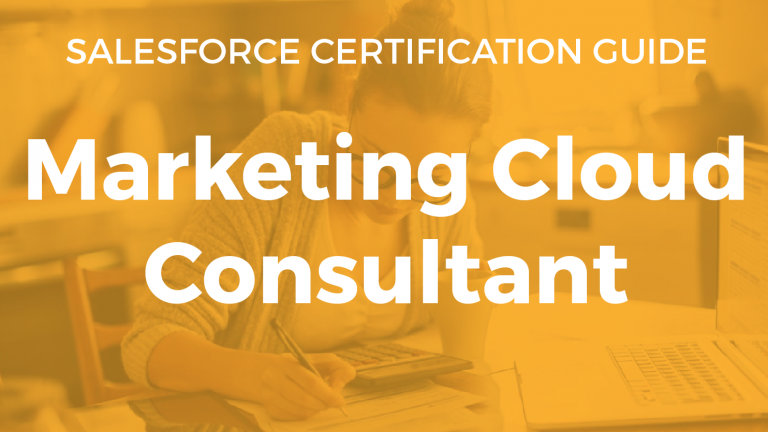
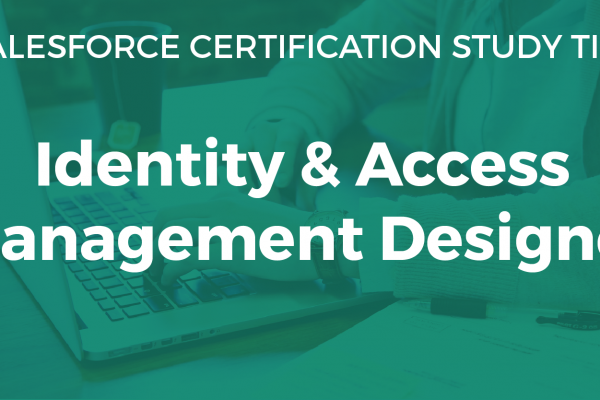
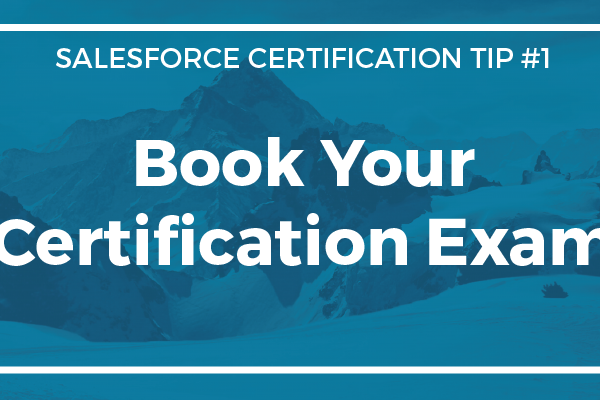
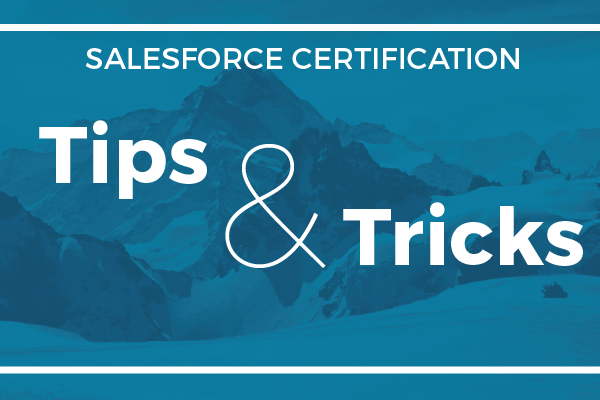
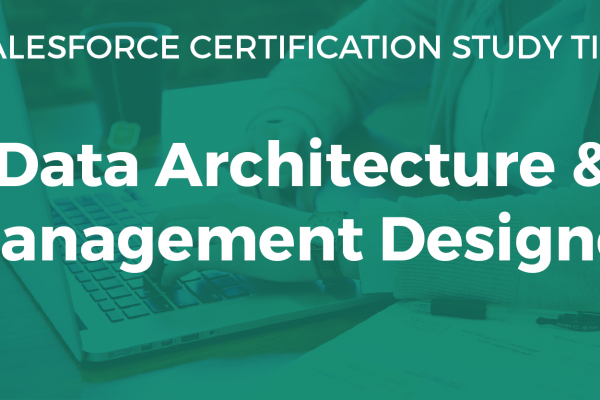
Hi Chris,
I absolutely love this guide, thank you! I’ve been preparing for this exam for a couple of months and believe I’m ready to take it at Dreamforce, but I wanted to see if there was any area in particular that was particularly challenging for you? Trying to make the most of my remaining month!
Thanks,
Dave
I’m glad you’ve enjoyed the guide. For me, there were a few areas that I remember having questions:
Hopefully that gives you a little more to study. Best of luck on the exam at Dreamforce!
Thank you so much, Chris! I appreciate your response and quick feedback.
Hi Chris,
Thank you for this guide as I think this is the best we can get online!
I wanted to ask you if there’s a way I can get practical exposure to the implementation aspect of Salesforce just for exam preparation? I have experience in email part and have successfully completed the first level of certification (email specialist) but I wanted to gain hands-on implementation experience before I go for consultant exam.
That’s a tricky one. Salesforce doesn’t provide developer orgs for Marketing Cloud, so you can’t gain practical experience there. The only way to get hands-on experience is to work within the tool. If you work for a consulting partner, they may have access through the company. If you work for an end user company who doesn’t own it, it is pretty difficult to actually get practical experience doing implementation work.
Alright..
Thank you for your response and guidance, Chris!
Thanks, Chris, is there an updated link for the ‘Official Certification Guide’ – the one there goes to a dead page.
Yes, here is the updated link: https://trailhead.salesforce.com/help?article=Salesforce-Certified-Marketing-Cloud-Consultant-Exam-Guide.
This URL is no longer active
Official Certification Guide
http://certification.salesforce.com/SG_CertifiedMarketingCloudConsultant.pdf
Yes, they have moved their guides to another format. I still need to go through and update many of my links. Here is the updated one:
https://trailhead.salesforce.com/help?article=Salesforce-Certified-Marketing-Cloud-Consultant-Exam-Guide
Hi Chris,
Can you please help me with the below question?
Client wants to trigger an email when the status field on the lead object changes to hot. Tracking data kept in sales cloud. What do you do?
choose 3:
a. create the triggered send definition in Sales Cloud
b. create the triggered send definition in Marketing Cloud
c. Enable triggered sends on the lead object in configuration
d. Write an apex trigger on the lead object
c & d are correct.
I am confused between creating the send definition in Sales Cloud vs Marketing cloud?
You create triggered send definitions inside of Marketing Cloud, not inside of Sales Cloud. So the answer is B.
For all the Salesforce Marketing Cloud users, I’ve really enjoyed being part of the UX research group. You can participate in focus groups and even get an honorarium for a little of your time.
Here’s a link to sign up and then they’ll send you periodic emails with opportunities.
https://design.secure.force.com/ux?rc=5cdfc96163cfb88
A start-up meal delivery company recently launched in Canada to great success. Through their website, customers can order individual meal kits for up to six people or subscribe to a weekly meal kit delivery. As a new company, resources are limited, but demand is taxing their manual processes for sending out ecommerce messages, such as order confirmation and subscription confirmations. What recommendation would best provide a scalable solution for the start-up?
a) A manual email send for each transactional message.
b) A triggered automation to send transactional messages.
c) Triggered email sends to deliver transactional messages.
d) An automated program to send daily transactional messages.
The answer is C and not B because it’s on the website and email can be triggered directly .
A customer needs to link demographic information to its contact model in Contact Builder. What type of relationship should be used?
a) One -to -Many Relationship
b) Many -to -Many Relationship
c) One -to -One Relationship
d) Many -to -One Relationship
The answer C while i researched on the help and training.https://help.salesforce.com/articleView?id=mc_cab_data_designer.htm&type=5
Hey Chris
Just wondering if you know whether SF changes the MC Consultant Cert Exam recently? I purchased a 1.5 year old guided course on Udemy and I am now concerned it’s content may not be relevant anymore.
Kind Regards,
Chris
They do update the content on a regular basis (typically once per year), but the changes aren’t usually drastic. The Marketing Cloud exam breakdown hasn’t changed much recently, so the content itself should be relevant. I’d just make sure to spend a little time reviewing some of the newly released MC features to make sure you don’t have any knowledge gaps.
Hi Chris,
I am preparing for the Salesforce Certified Marketing Cloud Consultant and saw that the guide is update to Winter ’21 Release (https://trailhead.salesforce.com/help?article=Salesforce-Certified-Marketing-Cloud-Consultant-Exam-Guide).
Do you know which topic include this request: Evaluate implications on data model when choosing contact identity?
Thank you,
Ana Clara